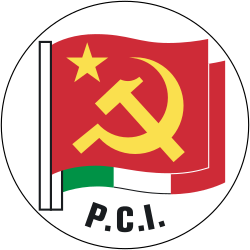History
Constituted in 1949, its peak was in the 1960s, when its membership reached 200,000 and it thus sought to gain a profile independent of its parent organisation. The Federation's newsletters and publications thus assumed a more avant-garde role, most importantly "La città futura" (taking its name from a special issue published in February 1917 by the Federazione giovanile piemontese del Partito Socialista drawn up by Antonio Gramsci himself) and "Nuova generazione" (drawn up, not without some protests, in 1956).
On 8 October 1990 Gianni Cuperlo (the secretary of the FGCI) proposed to Ariccia, following the line of Achille Occhetto, that the FGCI be dissolved in order to create the Sinistra Giovanile, a federal organisation with the aim of creating four associations in schools, in territories, in universities, in workplaces, all federated together. The proposal was passed, with 91 votes in favour, 10 abstentions and 13 against.
On 19 December 1990, the 25th and last congress of the FGCI opened at Pesaro, and on 22 December the FGCI dissolved itself with 356 of the 491 votes (72.5%) being in favour, out of a membership of 55,000. Most of the FGCI moved to the new Democratic Party of the Left, which in 1992 gave birth to the Sinistra Giovanile del PDS (renamed simply Sinistra Giovanile in 1998). A minority, which first adhered to the Movimento per la Rifondazione Comunista and then to the Communist Refoundation Party, in 1995 gave birth to the Young Communists (GC).
When the Party of Italian Communists (PdCI) was born in 1998 as the result of a split in the PRC, the new party created the Youth Federation of Italian Communists (FGCI) on the model of the dissolved federation.
Periodicals printed by the FGCI were Gioventù d'avanguardia (1949–1953), Il costruttore (1950–1956), Nuova generazione (monthly then sometimes weekly, 1956–1977), La città futura (weekly, 1977–1979).
This page is based on this
Wikipedia article Text is available under the
CC BY-SA 4.0 license; additional terms may apply.
Images, videos and audio are available under their respective licenses.

